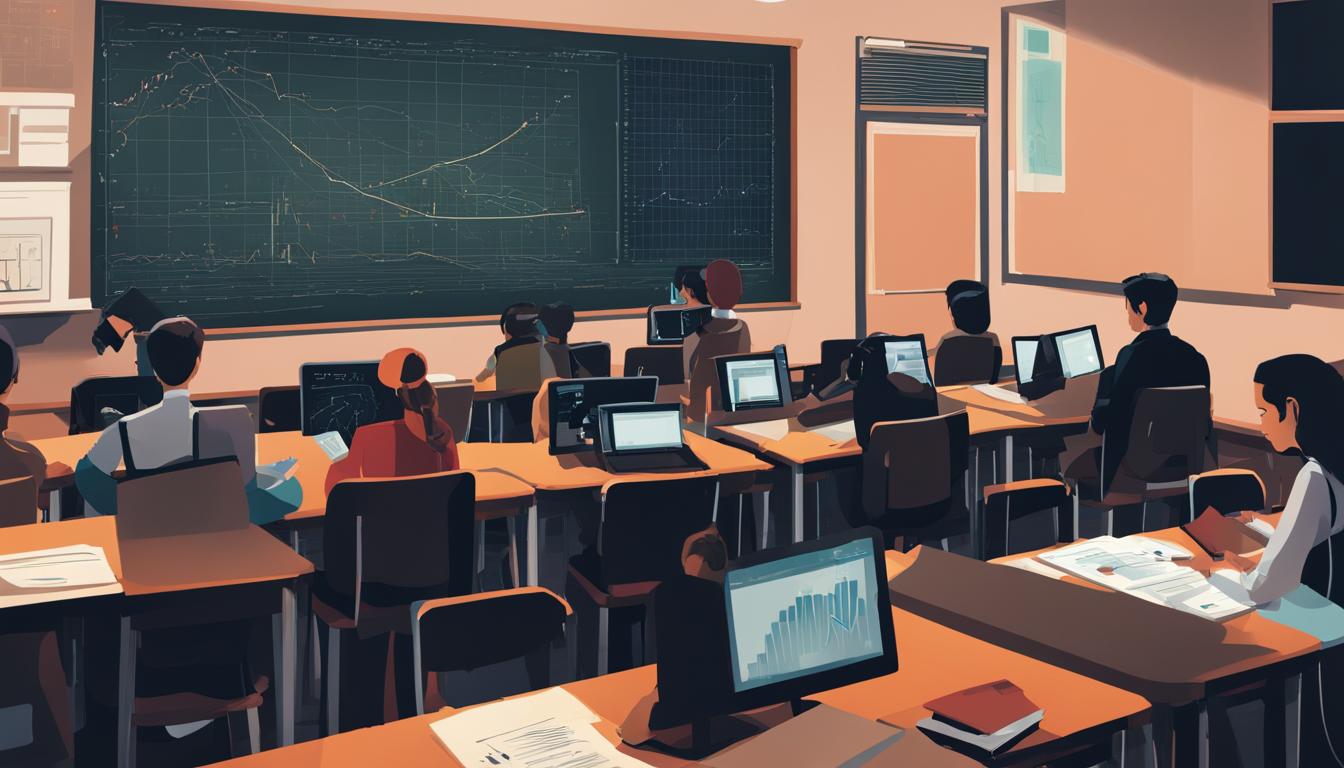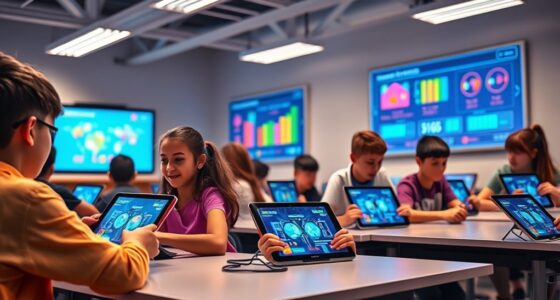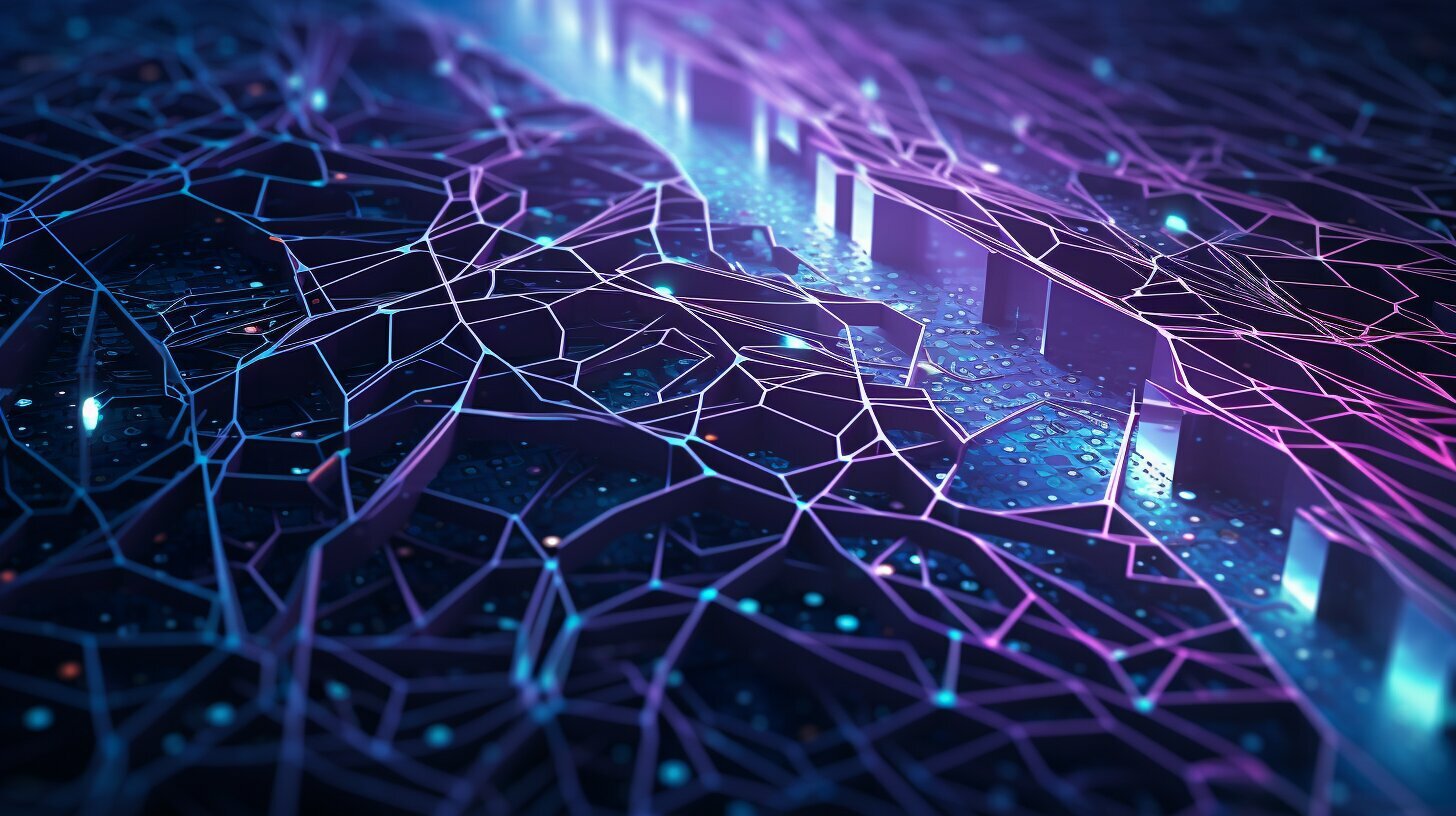Lately, the rise of artificial intelligence (AI) has sparked both excitement and concern in the realm of education. AI-powered chatbots, like ChatGPT, have gained significant attention and caused upheaval in schools since they were introduced towards the end of 2022. As teachers, we find ourselves navigating a new terrain where students have access to AI resources that can write papers and help cheat on tests. This raises important questions about the impact of AI on the educational journey and the personal development of our students.
Key Takeaways:
- AI chatbots like ChatGPT have caused disruption in schools
- Educators are grappling with the impact of AI on the learning process
- AI can be both a tool for enhancement and a cause for concern
- There is a need for responsible AI research and implementation
- Striking a balance between AI-driven innovation and human touch is essential
The Pros and Cons of AI in Classrooms
When it comes to integrating artificial intelligence (AI) into classrooms, there are both positive and negative effects to consider. On one hand, AI can revolutionize the way students learn by providing increased efficiency and personalized learning experiences. AI-powered tools can offer individualized feedback, adapt to students’ needs, and provide real-time assistance. This can help students grasp concepts more effectively and at their own pace.
However, there are concerns about the potential negative impacts of relying too heavily on AI in education. Critics argue that excessive use of AI tools may hinder critical thinking skills and discourage self-discovery. AI chatbots, for example, can facilitate cheating and reduce opportunities for social interaction among students. It is important to strike a balance between leveraging AI for its benefits and ensuring that it does not hinder the overall learning experience.
The Pros of AI in Classrooms
- Increased efficiency through personalized learning experiences
- Individualized feedback and adaptive learning
“AI can revolutionize the way students learn by providing increased efficiency and personalized learning experiences.”
The Cons of AI in Classrooms
- Potential hindrance to critical thinking skills
- Ethical challenges like cheating facilitated by AI chatbots
While AI has the potential to enhance education, it is crucial to address these concerns and ensure responsible implementation. Educators and policymakers should carefully evaluate the benefits and drawbacks of AI in classrooms and establish guidelines that prioritize the holistic development of students.
Addressing Concerns about AI in Education
As the integration of artificial intelligence (AI) in classrooms becomes more prevalent, educators and school districts face the challenge of addressing concerns and navigating the implications of this technology. The use of AI chatbots and other AI tools in educational settings has sparked debates about ethical considerations, potential negative effects, and the impact on students’ social and emotional well-being.
The Challenges of AI Integration in Classrooms
One of the main challenges of AI integration in classrooms is determining the appropriate use of AI chatbots. While these tools can assist students in generating outlines or providing feedback, there are concerns about their potential misuse for cheating or reliance on AI to perform critical thinking tasks. School districts must carefully consider whether to ban AI chatbots outright or develop guidelines and policies to regulate their use.
Furthermore, the accessibility of AI chatbots poses a challenge to enforcement. Students can access these tools through personal devices or virtual private networks (VPNs), making it difficult for educators to monitor and control their usage. This raises questions about how school districts can effectively address concerns and ensure that AI technology is used responsibly and ethically in educational settings.
Supporting Students’ Social and Emotional Well-Being
Another important consideration in the integration of AI in education is its potential impact on students’ social and emotional development. The increased reliance on AI chatbots and other AI tools may reduce opportunities for social interaction among students, which can have implications for their social skills and emotional well-being.
To address this concern, educators can implement social-emotional learning (SEL) curricula that focus on developing competencies such as self-awareness, empathy, and responsible decision-making. By incorporating SEL into the educational framework, schools can help students navigate the challenges and opportunities presented by AI technology while fostering their overall well-being.

| Benefits of AI Integration in Education | Challenges of AI Integration in Education |
|---|---|
|
|
Overall, addressing concerns about AI in education requires a careful balance between leveraging the benefits of AI integration and addressing the challenges and potential negative effects. By developing clear guidelines, fostering social-emotional learning, and prioritizing responsible and ethical AI usage, educators can create a learning environment that harnesses the potential of AI while ensuring the holistic development of students.
The Impact of AI on Student Performance
As AI continues to make its way into classrooms, there is a growing interest in understanding its impact on student performance. While the integration of AI holds promises for personalized learning and increased efficiency, its effects on academic achievement are still relatively unknown. Ongoing research and evaluation are necessary to gain insights into how AI can enhance or hinder student learning.
One area of focus is how AI influences student engagement. With personalized feedback and adaptive learning algorithms, AI has the potential to keep students more engaged and motivated. By tailoring instruction to individual needs, AI can help students grasp complex concepts and acquire knowledge more effectively. However, it is crucial to strike a balance between AI-driven instruction and maintaining the essential human element of education.
Moreover, the use of AI chatbots in the learning process raises questions about the development of critical thinking skills. While chatbots can provide immediate answers and assist with information retrieval, they may limit students’ opportunities for independent thinking and problem-solving. Educators must ensure that AI is used as a tool to support and enhance critical thinking rather than replace it.
| Factors | Positive Impact | Negative Impact |
|---|---|---|
| Improved engagement | Personalized learning | Reduced critical thinking |
| Efficient instruction | Adaptive learning | Limited independent thinking |
| Enhanced performance tracking | Identifying learning gaps | Overreliance on data |
Lastly, the use of AI can facilitate performance tracking and identify learning gaps. AI can analyze large amounts of student data, providing educators with insights into individual progress and areas for improvement. Through data-driven interventions, educators can tailor instruction to meet the needs of every student. However, it is crucial to avoid overreliance on data and maintain a holistic approach to education.
In conclusion, the impact of AI on student performance is a complex topic that requires further research and evaluation. While AI has the potential to enhance engagement, instruction, and performance tracking, educators must carefully consider its limitations and ensure that AI is used as a tool to support critical thinking and holistic development. By striking a balance between AI-driven innovation and the preservation of human touch in education, we can harness the benefits of AI while nurturing the unique abilities of each student.
AI and the Future of Education
The integration of AI in education raises questions about the future of the traditional educational system. Some fear that AI may replace teachers and make education irrelevant. Others argue that AI can enhance teaching practices and provide new learning opportunities. It is crucial to strike a balance between AI-driven innovation and the preservation of human touch in education.
AI has the potential to revolutionize classrooms by providing personalized learning experiences, adapting to students’ needs, and offering individualized feedback. However, concerns arise about overreliance on AI, which may hinder critical thinking skills and self-discovery. Additionally, AI chatbots can pose ethical challenges, such as enabling cheating and reducing social interaction among students.
While AI can bring efficiency and technological advancements to education, there will always be a need for human touch in certain areas like education and medicine. Socially and emotionally intelligent human beings can provide authentic human connections and understanding, which are essential for managing stress, overcoming obstacles, and fostering holistic growth. It is vital to recognize the value of human interaction alongside AI integration in classrooms.
The Role of Social-Emotional Learning in the AI Era
In the age of AI, social-emotional learning (SEL) becomes increasingly important. While AI chatbots may assist with information retrieval, they cannot replace the process of self-discovery and the development of independence and resilience. SEL curricula can help students build confidence, develop relationship skills, and prepare for the future workforce, where social-emotional skills will be highly valued.
| Pros | Cons |
|---|---|
| Personalized learning experiences | Overreliance on AI may hinder critical thinking skills |
| Adaptation to students’ needs | AI chatbots can enable cheating |
| Individualized feedback | Reduced social interaction among students |
The Role of Social-Emotional Learning in the AI Era
Social-emotional learning (SEL) plays a crucial role in the age of AI, as it complements the capabilities of AI chatbots in education. While AI chatbots can assist with information retrieval, they cannot replace the process of self-discovery and the development of independence and resilience. SEL curricula offer students a holistic approach to education, focusing on the development of social and emotional skills that are essential for success in the AI era.
SEL helps students build confidence and self-awareness, enabling them to navigate the complexities of a technology-driven world. By fostering empathy and emotional intelligence, SEL empowers students to form meaningful connections and develop healthy relationships. These skills become increasingly important as AI becomes more prevalent in our lives, as students will need to understand and navigate the ethical and social implications of AI.
“The integration of SEL in education ensures that students develop the skills necessary to thrive in a world where AI is ever-present. Empathy, resilience, and responsible decision-making are traits that cannot be fully replicated by AI,” says Dr. Jane Thompson, a leading expert in educational psychology.
Moreover, SEL prepares students for the future workforce, where social and emotional skills will be highly valued. As AI continues to revolutionize industries, the ability to collaborate, communicate effectively, and problem-solve with others becomes paramount. SEL equips students with these skills, enabling them to thrive in a rapidly evolving job market.
In summary, while AI chatbots have their educational benefits, they cannot replace the importance of social-emotional learning. As we embrace the AI era, it is vital to prioritize the development of social and emotional skills in students. By combining the power of AI with the human touch of SEL, we can create an educational environment that nurtures well-rounded individuals prepared for the challenges and opportunities of the future.
The Need for Responsible AI Research and Implementation
As AI continues to make its way into classrooms, it becomes increasingly important for researchers and developers to prioritize responsible AI research and implementation. With the potential impact on education, it is crucial to ensure that AI is being used ethically and in a way that benefits students and educators.
One key aspect of responsible AI research is the peer review process. By subjecting AI research to rigorous evaluation by experts in the field, we can prevent harmful outcomes from being implemented in educational settings. This ensures that AI systems are designed and deployed with the best interests of students in mind.
Responsible implementation of AI in education also involves considering the social implications. It is essential to develop AI systems that are sensitive to the diverse needs and backgrounds of the communities they serve. By including diverse perspectives in the development process, we can create AI systems that are more equitable and inclusive.
Ongoing evaluation is another crucial component of responsible AI implementation. As technology evolves and new challenges arise, it is important to continually assess the impact of AI on education. This allows educators and policymakers to make informed decisions and adapt their approaches to ensure the ethical and effective use of AI in the classroom.
| Benefits of Responsible AI Research and Implementation | Challenges of AI in Education |
|---|---|
| Enhanced learning experiences for students | Ethical concerns surrounding data privacy and security |
| Improved efficiency and personalized learning | Potential biases in AI algorithms |
| Opportunities for innovation and growth | Overreliance on AI leading to decreased critical thinking skills |
By addressing concerns and challenges through responsible AI research and implementation, we can harness the full potential of AI while safeguarding the well-being and development of students. It is our collective responsibility to ensure that AI is used responsibly in education, empowering students to thrive in an increasingly digital world.
The Importance of Human Touch in Education
While AI can bring efficiency and technological advancements to education, it is crucial to recognize the vital role of human touch in the learning process. Socially and emotionally intelligent human beings can provide authentic human connections and understanding, which are essential for managing stress, overcoming obstacles, and fostering holistic growth in students.
AI revolution in schools should be seen as a complement to human interaction rather than a replacement. The human touch enables educators to create a nurturing and supportive environment where students feel seen, heard, and valued. Educators can provide personalized guidance and mentorship, addressing the unique needs and challenges of each student. Through face-to-face interactions, teachers can foster critical thinking, curiosity, and creativity in ways that AI cannot replicate.
Moreover, human touch in education extends beyond academic growth. It encompasses the social and emotional development of students. Interacting with peers and teachers in person allows students to develop essential interpersonal skills, such as empathy, collaboration, and conflict resolution. These skills are crucial for building healthy relationships and succeeding in the future workforce, where social-emotional intelligence is highly valued.

The Role of Social-Emotional Learning (SEL)
While AI chatbots may assist with information retrieval, they cannot replace the process of self-discovery and the development of independence and resilience. Social-emotional learning (SEL) curricula play a vital role in nurturing these skills alongside AI integration in classrooms. SEL helps students build confidence, develop relationship skills, make responsible decisions, and cope with challenges effectively.
By incorporating SEL into education alongside AI, we can ensure that students acquire the necessary skills to thrive in the AI era while still valuing human connection and emotional well-being. It is the balanced combination of AI and human touch that will pave the way for a future education system that prepares students holistically for the challenges and opportunities ahead.
Conclusion
The impact of AI on education is a topic that requires careful consideration. While there are concerns about how AI chatbots may disrupt the learning process and hinder students’ social and emotional development, we must also recognize the potential benefits they offer. As educators, policymakers, and researchers, it is our responsibility to navigate the integration of AI in classrooms.
By addressing the concerns surrounding AI in schools and leveraging its potential, we can enhance student learning and prepare them for the future. This requires us to prioritize responsible AI research and implementation. Responsible AIEd practices should prioritize ethical considerations, diversity, and ongoing evaluation to ensure equitable use of AI in education.
Although AI brings efficiency and technological advancements, we must never overlook the significance of human touch in education. Socially and emotionally intelligent human beings play a crucial role in providing authentic connections, understanding, and support. Recognizing and valuing the importance of human interaction alongside AI integration is essential for holistic growth and overcoming challenges.
In conclusion, the impact of AI on education is a complex issue. While we must address concerns about AI in schools, we can also harness its potential to enhance student learning. By carefully navigating the integration of AI, prioritizing responsible research and implementation, and recognizing the value of human touch, we can ensure that AI becomes a valuable tool in education rather than a detriment.
FAQ
Is AI ruining school?
AI chatbots have caused disruption in schools, but their impact on education is complex. While there are concerns about cheating and reduced social interaction, AI also offers advantages such as personalized learning and increased efficiency.
What are the pros and cons of AI in classrooms?
AI in classrooms can provide individualized feedback and adapt to students’ needs, but there are concerns about overreliance on AI and its potential to hinder critical thinking skills and self-discovery.
How do we address concerns about AI in education?
Educators and policymakers need to navigate the integration of AI carefully. Bans on AI chatbots may be challenging to enforce, so finding ways to support students’ social and emotional well-being is crucial. Social-emotional learning (SEL) can help students develop essential competencies.
What is the impact of AI on student performance?
The effects of AI on student performance are still relatively unknown. Further research is necessary to understand how AI can enhance or hinder student learning and academic achievement.
What does the future of education with AI look like?
The integration of AI in education raises questions about the traditional educational system. While some fear that AI may replace teachers, others argue that AI can enhance teaching practices and provide new learning opportunities.
What is the role of social-emotional learning in the AI era?
Social-emotional learning (SEL) becomes increasingly important in the age of AI. While AI chatbots may assist with information retrieval, SEL helps students build confidence, develop relationship skills, and prepare for the future workforce.
How can we ensure responsible AI research and implementation?
Responsible AI research and implementation should prioritize ethical considerations, diversity of perspectives, and ongoing evaluation to ensure the ethical and equitable use of AI in education.
What is the importance of human touch in education?
While AI can bring efficiency and advancements, human interaction remains crucial in areas like education. Socially and emotionally intelligent human beings provide authentic connections and understanding, which are essential for holistic growth.
What is the conclusion on AI’s impact on education?
The impact of AI on education is a complex topic. By prioritizing responsible AI research and implementation, educators can leverage the potential of AI to enhance student learning while maintaining the value of human touch in education.









